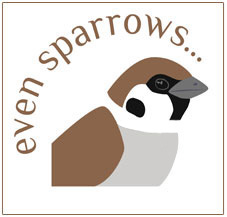

CONVICTIONS OF A BIRDER
Posted: 01.12.24 in Articles category
EVEN SPARROWS WEBSITE ARTICLE FOR DECEMBER 2024
This month’s article is the first in a series written by various friends who enjoy watching birds as their hobby and try to relate their birding interest to their personal Christian faith. Local birder, David Peel, is one such friend who like me developed his love of birds from a young age and, as you can read for yourself, that passion hasn’t dimmed!
Convictions of a Birder
I have never known a time when I was not in awe of the natural world. Perhaps this disposition is wired into my DNA? Equally possible is that I picked it up from early influences, like a grandfather who loved the outdoors and a Junior School teacher who often used nature as a teaching aid. Whether through nature or nurture, though, the scene was set for me to fall in love with birds.
The Apostle Paul argues that all human beings – simply because they are created by God – have been given a knowledge of God “through the things God has made” (Rom. 1: 19). If we attend to the natural world, rather than simply use it, we become open to encountering what Peter Berger, an American sociologist, has called “signals of transcendence”. Paul is equally forthright in his belief that those who turn their backs on such God-given knowledge become “futile in their thinking”, with “their senseless minds” being “darkened” (Rom. 1:20). No wonder, then, that poets and philosophers like Wordsworth and Coleridge searched for the roots of our understanding beyond the Procrustean bid of secular rationality.
In the formative years of my theological studies I was greatly influenced by Charles Hartshorne, an American philosophical theologian. His way of constructing the God-world relationship and picturing God conceptually helped me make connections between my Christian faith and early scientific studies. When it was my good fortune to meet him he was well into his nineties and seemly more taken up by listening to bird song than discussing the details of his theological thinking. He had become convinced that listening to God’s “avian disciples” is an important counterpart to our searching for adequate ways of talking about God. Those who have been enthralled by a dawn chorus will know what Hartshorne was alluding to.
Jesus drew upon avian illustrations in his preaching. In doing so he was following a rich Hebrew tradition that often used birds in its story telling and psalm singing: the dove enters folklore as a symbol of peace (see Gen. 8: 6-12) and the mighty eagle is deployed as an illustration of the way in which God will raise up downtrodden and oppressed people (see Ex. 19: 4 and Ps. 103: 5). Against the overpowering nature of Temple religion, which was often in league with the Roman rulers, Jesus represented the ethos and values of rural synagogue Judaism. He looked disdainfully at the excessive pomp and ceremony of the Temple officials asserting that “even Solomon in all his glory was not clothed like one of these [lilies]” (Matt. 6: 29) – but he could have used any colourful middle Eastern bird as his illustration. He made his village contemporaries feel ten feet tall: “Look at the birds of the air; they neither sow nor reap nor gather into barns” like you do, “yet your heavenly Father feeds them. Are you not of more value than they?” (Matt. 6: 26).
What attracts me to birds is not just their intrinsic beauty but also their rich diversity: majestic raptor, comic puffin, delicate warbler as well as opportunist cuckoo. I make lists of the birds I see and where I see them. Looking through these lists brings back precious memories. I am also reminded repeatedly that we share our world with our avian friends. Birds often put me in my place. I’m not as good looking as a mandarin; I cannot fly like a swift; nor can I swim as well as an auk! Some birds, though, are now threatened by our mismanagement of our common habitat. Birds that were commonplace when I started birding are becoming rarities. Global warming is making a significant impact, but some of our anthropocentric activities are also to blame. Moors which once held raptors like harriers and owls are now becoming avian deserts – save for the grouse reared on them for the profitable shooting industry.
The closer to nature we get, the more we will re-discover our responsibility to be generous stewards of it. We desperately need to capture a “reverence for life” (Albert Schweitzer).
David R.Peel